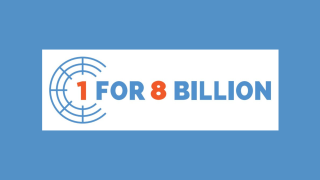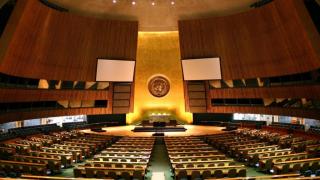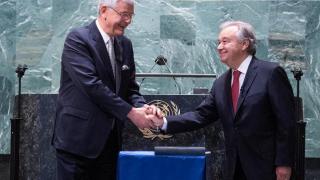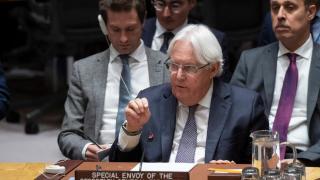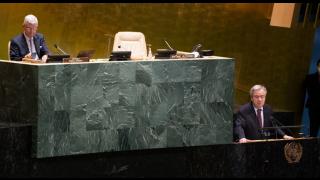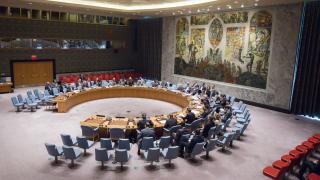
The UN Security Council held its fifth round of straw polls on 26 September to determine which candidate it will put forward to replace Ban Ki-moon as the next Secretary-General. While the Security Council has maintained its policy of not releasing the results, they have been publicised on social media after every poll.
View the results of the straw poll
Find out more about the process of straw polls
In the latest round, former Prime Minister of Portugal and former head of the UN Refugee Agency, Antόnio Guterres, maintained his lead for the fifth time running with 12 “encourage”, two “discourage” and one “no opinion” vote, the same numbers as in the fourth poll. This result makes him the only candidate receiving more than nine “encourage” votes. Translated into affirmative votes, this would be enough to be recommended by the Council as a candidate in a formal vote.
Serbia’s Vuk Jeremić rose to second position followed by Miroslav Lajčák (Slovak Republic), however both received two more discourage votes than in the previous round. On their heels Susana Malcorra (Argentina) maintained the same number of votes as in the last three polls but rose to fourth position, shared with Danilo Türk from Slovenia, both receiving seven “encourage” and seven “discourage” votes with one “no opinion”. Irina Bokova came in sixth place, weakening her position by receiving one less “encourage” vote and two more “discourage” votes. Srgjan Kerim (FYROM) dropped to seventh place with Helen Clark, both receiving six “encourage” votes and nine “discourage” votes. Natalia Gherman continued to receive the lowest score with three "encourages" and 11 “discourages”, as she did last time.
Late Entrants
Amidst growing speculation that there may still be late entrants into the candidate race, including the EU budget commissioner Kristalina Georgieva, UNA-UK's Head of Campaigns, Ben Donaldson, said;
UNA-UK would want to see the same level of scrutiny applied to any future candidate, both from the wider UN membership and civil society.
In an interview with the International Business Times, UNA-UK Campaigns and Communications Officer, Isabelle Younane, reiterated the need for the same high levels of public scrutiny as for previous candidates;
We are hoping that anyone who is brought forward is actually subjected to UN General Assembly dialogue before they are nominated by the UN Security Council.
She added that it would be both "disappointing" and "politically damaging" for the Security Council to select a candidate who had not undergone this process.
Next steps
The Council’s decision to recommend a candidate as Secretary-General to the General Assembly requires an affirmative vote of nine members, with its permanent five members concurring, i.e. not exercising their power to veto. In the latest round, only Guterres reached the equivalent number of votes needed.
All candidates received “discourage” votes, with Guterres receiving the lowest number: two. It is not known whether any of the ‘discourage’ votes are from veto-carrying members. On 5 October this will become clear when the Council holds its first colour-coded straw poll. The colour-coded poll distinguishes between the “permanent five” (USA, UK, Russia, France and China) veto-carrying members and the 10 non-veto-carrying members, and so makes it clear whether there is agreement amongst the most powerful states. However, the identity of a "permanent five" Council member will not be known unless the country in question identifies itself.
It is important to note that the straw polls carried out so far, including the upcoming colour-coded straw poll, are not official Council votes and that the use of the veto in coloured straw polls has not prevented a candidate from becoming Secretary-General in the past.
After one or more colour-coded straw polls, the Security Council will proceed to vote in a resolution recommending one (or more) candidate(s) to the General Assembly. The Assembly will then appoint the next Secretary-General in a resolution, the contents of which the Assembly started to discuss in a debate of 29 September, including the option of a longer, single term.

